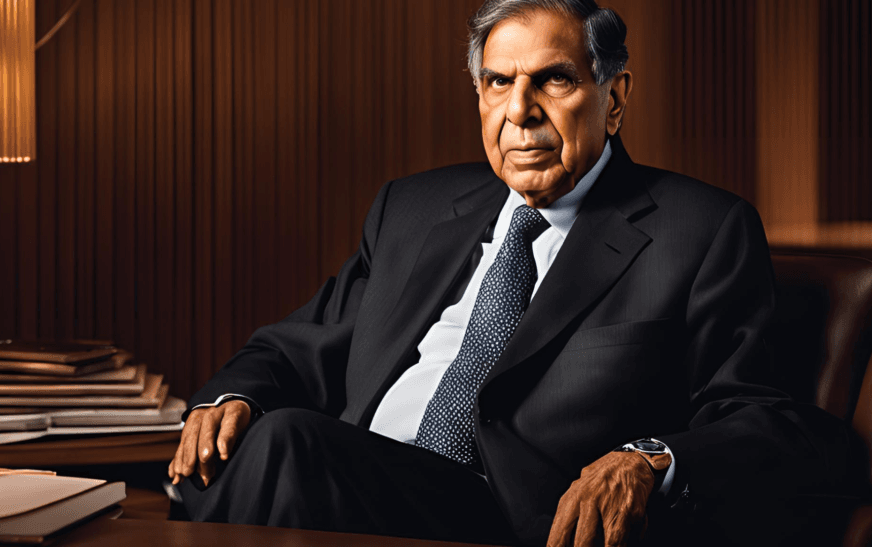The sad demise of Ratan Tata extinguishes the last link of a prominent image that Tata Group had in the minds of the Indian populace: trust, innovation, and values. Tata was the most famous industrialist in India, and while leaving behind, he left behind a legacy of a successful business tycoon but also a great philanthropist. He is an honoured post-chairman Emeritus of Tata Sons, and his instinctive oversight of the Tata Trusts has heavily influenced the course of the Indian industry and the world.
Now, the pressing question is: Now that Ratan Tata is eligible to retire, who will take over his position at Tata Trusts? Since the next leader should be chosen from the trustees, the selection process will be very important for the future of the Tata group. Continuing from the previous points we must look at the possible considerations for a successor selection and the position of Tata Trusts in India.
The Legacy of Ratan Tata
Ratan Tata helmed the Tata Group for over two decades, during which he changed the face of Indian business without compromising corporate morality and generosity. While in charge of Tata Group, the company experienced massive growth and went global, acquiring giants like Jaguar Land Rover and Corus Steel.
It might even be said that a greater influence is his active participation in the affairs of Tata Trusts. The Tata Trusts own 66% of Tata Sons, the flagship company of Tata Group. These are the Sir Dorabji Tata Trust and the Sir Ratan Tata Trust, which were used for noble courses such as health, learning, and rural development, making crucial impacts on the improvement of Indian society.
It would be clear that Tata’s philanthropic idea, which is now demonstrated by Tata Trusts, has always been the core of Tata’s leadership. He is dead and with his death, the future of these trusts will be dictated by the choice of the right successor from the list of existing trustees, which is truly going to chart the future course of Tata.
What Are Tata Trusts?
That said, let us first grasp some of the key dynamics of Tata Trusts before moving into potential successors. These trusts are non-profit organizations that have the largest controlling stake in Tata Sons and oversee the charitable activities of the conglomerate.
Over the years, Tata Trusts have contributed to various fields, including:
- Healthcare Initiatives: Providing money for hospitals and research relating to human health.
- Education: Grants for needy students and grants for schools, colleges, and other institutions.
- Social Welfare: Current directions include financing those that would help in the development of rural areas, sanitation, and clean water.
- Innovation and Research: Venture capital in advanced tools, emerging enterprises, and innovation centers.
These philanthropic activities have not only served to get communities out of poverty but have also helped to re-establish the Tata Group as a socially responsible company. Time will give a new leader of the Tata Trusts big shoes to fill as they seek to replicate Ratan Tata’s great work.
The Selection Process: Selecting One Of The Trustees
One of the crucial tasks after Ratan Tata’s death will be the selection of a new leader from the current list of trustees. These trustees are a set of people who are responsible for running the affairs of Tata Trusts and directing its huge array of charitable initiatives and endowments.
It is expected that the choice of the successor should be problematic because it would be hard to find a person as a recognized business leader in combination with a globally acknowledged symbol of ethical business and philanthropy as Ratan Tata. The trustees themselves will truly have to make certain that the successor holds Tata Core Values of truth, generosity, and knowledge of business.
Emphasis on Several Factors When Selecting a Successor
Vision and Leadership:
- Commitment to Philanthropy: Continuity of the Trusts” endeavors toward social responsibility is, therefore, essential. The new leader should be a humble person who has an interest in uplifting society and enhancing the lives of people in society through the various projects of the trusts.
- Financial Acumen: To manage Tata Trusts, which consists of mammoth resources, the management needs a person with a good sense of finances. Many decisions require balance: to invest in projects that could have significant positive consequences and to think about the endowment’s efficient further growth.
- Cultural Fit: Tata Trusts are clearly defined by and instilled with an ethical outlook as well as an organizational culture of diversity. The new head has to have a psyche with such an approach and guide his people in the context of the Tata Group values.
- Global Perspective: As the global outreach of Tata’s charity programs rises, the new head should have the perspective to guide the trust toward international charity initiatives but should not lose sight of Indian projects.
Possible Successor from the Current Trustees
A brief outline of the current trustees of Tata Trusts includes qualified top executives from different fields with a diverse standpoint. It is not easy to guess the exact choice, but some of the trustees work closer to the vision of Tata and possess experience.
Noel Tata
A name that has been mentioned in the past more often to take up the mantle of the company is Noel Tata, who is Ratan Tata’s half-brother. Noel Tata has great experience within the TATA Group; he has succeeded in Tata International and Tata Trent. Many people believe that Cyrus should be the head of the Tata group because he understands the latter’s business models and its functioning. Also, like Ratan, Noel knows social responsibility and therefore can match this role.
Venkataramanan (Venkat)
Another important candidate might have been R. Venkataramanan, a close friend of Ratan Tata for a very long time. Currently, he is the Vice Chairman of Tata and the Managing Trustee of Tata Trusts, which has involved him in the leadership of managing the function and the charitable activities of the trusts. He must be one of the leading contenders since he formerly had a working relationship with Ratan Tata and has grasped the objectives of the trust.
N. Chandrasekaran
Other members of the board include N. First Chandrasekaran, who is the Chairman of Tata Sons as well as a trustee of the foundation. The how aspect can be explained by scrutiny of his current roles at Tata and his previous roles at steel businessmen Tata Sons, where he currently led after the retirement of Ratan Tata. However, given his current assignment at Tata Sons Limited, it remains to be seen whether he will assume full responsibility for Tata Trusts or board another person to take the full responsibility.
Independent Trustees
Such independent trustees are Deepak Parekh of HDFC or Vijay Kelkar, former Finance Secretary of India, whose names may not be as often mentioned as possible successors, but they still add considerable financial and governance experience.
The Next Leader Stewardship Prospects and Obstacles
Ratan Tata’s successor will be boarding a company that enjoys a rather favorable reputation and public image, but the future is filled with challenges. These include:
- Managing Growing Expectations: Tata has had a legacy of philanthropy for several decades, and Tata Trusts is the testimony to it. There is a tendency for the organization to experience a rise in expectations from the public while at the same time dealing with the continuation of existing programs.
- Innovation in Philanthropy: However, with the times changing, so too has philanthropy. The emphasis is turning to impact investing and the models of sustainable funding, within which new leaders will need to act innovatively and maintain the corporate culture of Tata Trusts.
- Globalization of Initiatives: The good news is that where Tata Trusts has mostly concentrated on Indian initiatives, globalization presents new potential for world outreach. The new head must be capable of managing a portfolio that is relatively more global.
- Internal Dynamics: Everyone knows that large organizations always have certain internal issues, which sometimes can be the problem. The new leader must ensure that the trustees, the employees, and all other stakeholders coalesce to drive the continued efficient functioning of the trusts.
The Reason Why This Decision Is Important for India
The choice of who will take over from Ratan Tata goes beyond the Tata Group or Tata Trusts; the choice is capable of affecting the business environment in India and the philanthropic sector in the country, not to mention the worldwide efforts.
Tata Trusts have made a unique contribution to some of the most sensitive social welfare projects that have impacted millions of lives in the country. The new leader will have the authority to extend them and probably go further than existing practices in the organization.
Besides, Ratan Tata has been a man of high moral standards and ethics in his leadership style. On the choice of his successor, that decision will show the kind of commitment that this trust has for maintaining this legacy.
Final Thoughts: Upholding a Legacy
Thus we bid adieu to Ratan Tata as the leader, but for the Tata Group and the Tata Trusts, there is a journey ahead. This decision to select a successor from among the trustees will have long-lasting implications for the future of philanthropy in India and the international leadership role in social welfare.
The analysis indicates that while the world is mourning the death of one of India’s greatest industrialists and philanthropists, Tata Trusts has a herculean task on its hands. The challenges for the new leader of Tata Trusts will result from the expectations not only to continue Ratan Tata’s leadership but also the management of Tata Trusts at the dawn of forming a new vision, the development of innovative strategies, and continuing the mission of philanthropy and the creation of social capital.













